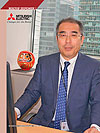Mitsubishi Electric: Energy of Peaceful Atom
Country of the Rising Sun has always been at the forefront of high technology. Prior to the accident at “Fukushima-1” nuclear power accounted for about 30% in the overall structure of the Japanese energy consumption. After the disaster the Japanese tried to compensate the lack of nuclear power with the increase in mineral resources imports and with generating own energy by renewable energy resources. Oil imports in the first years after the accident were growing. But such a replacement is very expensive for Japan’s budget, as rejection of peaceful atom has led to record trade deficit figures. Restarting the nuclear program in Japan after the events at “Fukushima-1” was a rather complicated and delicate matter. On the one hand, psychological aspect did not allow to restart using peaceful nuclear energy, because the memory was still keeping fresh fears after the accident. However, from an economic point of view NPP restart was only a matter of time. This adds additional strength to energy companies in improving their strategies. In the basis of nearly a century-long success of Mitsubishi Electric there is a special, time-tested and experience-tested company’s philosophy. Mitsubishi Electric proclaims seven basic principles of its activity: trust, quality, technology, social responsibility, flexibility, environmental protection and growth. Corporate motto of Mitsubishi Electric “Changes for the better” affirms the company’s commitment to continuous improvement in pursuit of the highest standards. This slogan promises to create a “better tomorrow” for each of the clients. In his exclusive interview with Alexander Ageev Katsuya Furuta, Mitsubishi Electric Group Vice President Nuclear Energy, Advanced Magnetic & Medical Systems Marketing Division, Energy & Industrial Systems Group, dwells on the level of the world’s trust in the company’s products, the main features of Japanese management, on the differences in doing business in our country, on promotion of Japanese brands in the Russian market and, of course, on Russian-Japanese relations.



